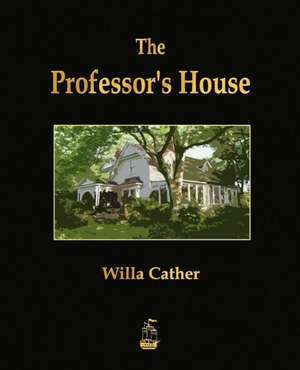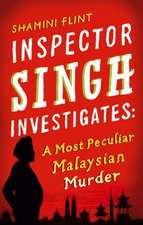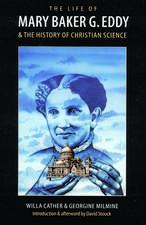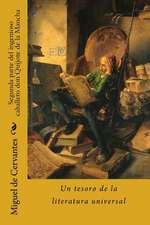The Professor's House
Autor Willa Catheren Limba Engleză Paperback – 22 noi 2012
| Toate formatele și edițiile | Preț | Express |
|---|---|---|
| Paperback (9) | 26.88 lei 3-4 săpt. | +10.11 lei 7-13 zile |
| Dover Publications Inc. – 27 aug 2021 | 26.88 lei 3-4 săpt. | +10.11 lei 7-13 zile |
| Little Brown Book Group – 7 sep 2006 | 48.07 lei 3-5 săpt. | +23.66 lei 7-13 zile |
| Vintage Publishing – 30 sep 1990 | 87.43 lei 3-5 săpt. | |
| ALPHA EDITION – 3 dec 2024 | 111.75 lei 3-5 săpt. | +46.69 lei 7-13 zile |
| LIGHTNING SOURCE INC – 15 oct 2018 | 57.88 lei 17-23 zile | |
| Oxford City Press – 5 aug 2011 | 67.56 lei 6-8 săpt. | |
| Merchant Books – 22 noi 2012 | 76.89 lei 6-8 săpt. | |
| Lector House – 26 iul 2019 | 80.26 lei 6-8 săpt. | |
| SMK Books – 23 oct 2008 | 93.68 lei 6-8 săpt. | |
| Hardback (4) | 138.35 lei 6-8 săpt. | |
| Benediction Classics – 12 feb 2012 | 138.35 lei 6-8 săpt. | |
| SMK Books – 3 apr 2018 | 176.61 lei 6-8 săpt. | |
| Bibliotech Press – 11 noi 2022 | 208.61 lei 17-23 zile | |
| Nebraska – sep 2002 | 464.46 lei 6-8 săpt. |
Preț: 76.89 lei
Nou
Puncte Express: 115
Preț estimativ în valută:
14.71€ • 15.40$ • 12.17£
14.71€ • 15.40$ • 12.17£
Carte tipărită la comandă
Livrare economică 05-19 aprilie
Preluare comenzi: 021 569.72.76
Specificații
ISBN-13: 9781603864732
ISBN-10: 1603864733
Pagini: 160
Dimensiuni: 191 x 235 x 9 mm
Greutate: 0.29 kg
Editura: Merchant Books
ISBN-10: 1603864733
Pagini: 160
Dimensiuni: 191 x 235 x 9 mm
Greutate: 0.29 kg
Editura: Merchant Books
Notă biografică
Born in 1873 to a family who had farmed in Virginia for generations, Willa Cather moved to her father's new ranch in Nebraska when she was eight. The raw frontier territories and the pioneer life of the Old West were to awaken her imagination and furnish the atmosphere for much of her later work. After graduating from the University of Nebraska, Willa Cather became a teacher and a journalist. In 1912 she abandoned journalism to write full time. Her first novel was Alexander's Bridge (1912) though she had already published a volume of poems and another of short stories. Her vivid novels cover a wide range: there are impassioned and thoughtful explorations of the ancient worlds of the Americas in The Professor's House (1925) and Death Comes for the Archbishop (1927) as well as sympathetic portrayals of conflicting values, or of the demands of art. These, along with her evocations of the pioneering West, soon established her reputation as one of America's foremost writers. Willa Cather died in New York in 1947.
Descriere
Descriere de la o altă ediție sau format:
A rich and suggestive work which contrasts the middle-aged disillusion of Professor St Peter with his memories of his favourite student, the brilliant explorer and inventor Tom Outland
A rich and suggestive work which contrasts the middle-aged disillusion of Professor St Peter with his memories of his favourite student, the brilliant explorer and inventor Tom Outland
Extras
ONE
The moving was over and done. Professor St. Peter was alone in the dismantled house where he had lived ever since his marriage, where he had worked out his career and brought up his two daughters. It was almost as ugly as it is possible for a house to be; square, three stories in height, painted the colour of ashes-the front porch just too narrow for comfort, with a slanting floor and sagging steps. As he walked slowly about the empty, echoing rooms on that bright September morning, the Professor regarded thoughtfully the needless inconveniences he had put up with for so long; the stairs that were too steep, the halls that were too cramped, the awkward oak mantles with thick round posts crowned by bumptious wooden balls, over green-tiled fire-places.
Certain wobbly stair treads, certain creaky boards in the upstairs hall, had made him wince many times a day for twenty-odd years-and they still creaked and wobbled. He had a deft hand with tools, he could easily have fixed them, but there were always so many things to fix, and there was not time enough to go round. He went into the kitchen, where he had carpentered under a succession of cooks, went up to the bath-room on the second floor, where there was only a painted tin tub; the taps were so old that no plumber could ever screw them tight enough to stop the drip, the window could only be coaxed up and down by wriggling, and the doors of the linen closet didn't fit. He had sympathized with his daughters' dissatisfaction, though he could never quite agree with them that the bath should be the most attractive room in the house. He had spent the happiest years of his youth in a house at Versailles where it distinctly was not, and he had known many charming people who had no bath at all. However, as his wife said: "If your country has contributed one thing, at least, to civilization, why not have it?" Many a night, after blowing out his study lamp, he had leaped into that tub, clad in his pyjamas, to give it another coat of some one of the many paints that were advertised to behave like porcelain, and didn't.
The Professor in pyjamas was not an unpleasant sight; for looks, the fewer clothes he had on, the better. Anything that clung to his body showed it to be built upon extremely good bones, with the slender hips and springy shoulders of a tireless swimmer. Though he was born on Lake Michigan, of mixed stock (Canadian French on one side, and American farmers on the other), St. Peter was commonly said to look like a Spaniard. That was possibly because he had been in Spain a good deal, and was an authority on certain phases of Spanish history. He had a long brown face, with an oval chin over which he wore a close-trimmed Van Dyke, like a tuft of shiny black fur. With this silky, very black hair, he had a tawny skin with gold lights in it, a hawk nose, and hawk-like eyes-brown and gold and green. They were set in ample cavities, with plenty of room to move about, under thick, curly, black eyebrows that turned up sharply at the outer ends, like military moustaches. His wicked-looking eyebrows made his students call him Mephistopheles-and there was no evading the searching eyes underneath them; eyes that in a flash could pick out a friend or an unusual stranger from a throng. They had lost none of their fire, though just now the man behind them was feeling a diminution of ardour.
His daughter Kathleen, who had done several successful studies of him in water-colour, had once said:-"The thing that really makes Papa handsome is the modelling of his head between the top of his ear and his crown; it is quite the best thing about him." That part of his head was high, polished, hard as bronze, and the close-growing black hair threw off a streak of light along the rounded ridge where the skull was fullest. The mould of his head on the side was so individual and definite, so far from casual, that it was more like a statue's head than a man's.
From one of the dismantled windows the Professor happened to look out into his back garden, and at that cheerful sight he went quickly downstairs and escaped from the dusty air and brutal light of the empty rooms.
His walled-in garden had been the comfort of his life-and it was the one thing his neighbours held against him. He started to make it soon after the birth of his first daughter, when his wife began to be unreasonable about his spending so much time at the lake and on the tennis court. In this undertaking he got help and encouragement from his landlord, a retired German farmer, good-natured and lenient about everything but spending money. If the Professor happened to have a new baby at home, or a faculty dinner, or an illness in the family, or any unusual expense, Appelhoff cheerfully waited for the rent; but pay for repairs he would not. When it was a question of the garden, however, the old man sometimes stretched a point. He helped his tenant with seeds and slips and sound advice, and with his twisted old back. He even spent a little money to bear half the expense of the stucco wall.
The Professor had succeeded in making a French garden in Hamilton. There was not a blade of grass; it was a tidy half-acre of glistening gravel and glistening shrubs and bright flowers. There were trees, of course; a spreading horse-chestnut, a row of slender Lombardy poplars at the back, along the white wall, and in the middle two symmetrical, round-topped linden-trees. Masses of green-brier grew in the corners, the prickly stems interwoven and clipped until they were like great bushes. There was a bed for salad herbs. Salmon-pink geraniums dripped over the wall. The French marigolds and dahlias were just now at their best-such dahlias as no one else in Hamilton could grow. St. Peter had tended this bit of ground for over twenty years, and had got the upper hand of it. In the spring, when homesickness for other lands and the fret of things unaccomplished awoke, he worked off his discontent here. In the long hot summers, when he could not go abroad, he stayed at home with his garden, sending his wife and daughters to Colorado to escape the humid prairie heat, so nourishing to wheat and corn, so exhausting to human beings. In those months when he was a bachelor again, he brought down his books and papers and worked in a deck chair under the linden-trees; breakfasted and lunched and had his tea in the garden. And it was there he and Tom Outland used to sit and talk half through the warm, soft nights.
On this September morning, however, St. Peter knew that he could not evade the unpleasant effects of change by tarrying among his autumn flowers. He must plunge in like a man, and get used to the feeling that under his work-room there was a dead, empty house. He broke off a geranium blossom, and with it still in his hand went resolutely up two flights of stairs to the third floor where, under the slope of the mansard roof, there was one room still furnished-that is, if it had ever been furnished.
The low ceiling sloped down on three sides, the slant being interrupted on the east by a single square window, swinging outward on hinges and held ajar by a hook in the sill. This was the sole opening for light and air. Walls and ceiling alike were covered with a yellow paper which had once been very ugly, but had faded into inoffensive neutrality. The matting on the floor was worn and scratchy. Against the wall stood an old walnut table, with one leaf up, holding piles of orderly papers. Before it was a cane-backed office chair that turned on a screw. This dark den had for many years been the Professor's study.
Downstairs, off the back parlour, he had a show study, with roomy shelves where his library was housed, and a proper desk at which he wrote letters. But it was a sham. This was the place where he worked. And not he alone. For three weeks in the fall, and again three in the spring, he shared his cuddy with Augusta, the sewing-woman, niece of his old landlord, a reliable, methodical spinster, a German Catholic and very devout.
Since Augusta finished her day's work at five o'clock, and the Professor, on week-days, worked here only at night, they did not elbow each other too much. Besides, neither was devoid of consideration. Every evening, before she left, Augusta swept up the scraps from the floor, rolled her patterns, closed the sewing-machine, and picked ravellings off the box-couch, so that there would be no threads to stick to the Professor's old smoking-jacket if he should happen to lie down for a moment in working-hours.
St. Peter, in his turn, when he put out his lamp after midnight, was careful to brush away ashes and tobacco crumbs-smoking was very distasteful to Augusta-and to open the hinged window back as far as it would go, on the second hook, so that the night wind might carry away the smell of his pipe as much as possible. The unfinished dresses which she left hanging on the forms, however, were often so saturated with smoke that he knew she found it a trial to work on them next morning.
These "forms" were the subject of much banter between them. The one which Augusta called "the bust" stood in the darkest corner of the room, upon a high wooden chest in which blankets and winter wraps were yearly stored. It was a headless, armless female torso, covered with strong black cotton, and so richly developed in the part for which it was named that the Professor once explained to Augusta how, in calling it so, she followed a natural law of language, termed, for convenience, metonymy. Augusta enjoyed the Professor when he was risqu?, since she was sure of his ultimate delicacy. Though this figure looked so ample and billowy (as if you might lay your head upon its deep-breathing softness and rest safe forever), if you touched it you suffered a severe shock, no matter how many times you had touched it before. It presented the most unsympathetic surface imaginable. Its hardness was not that of wood, which responds to concussion with living vibration and is stimulating to the hand, nor that of felt, which drinks something from the fingers. It was a dead, opaque, lumpy solidity, like chunks of putty, or tightly packed sawdust-very disappointing to the tactile sense, yet somehow always fooling you again. For no matter how often you had bumped up against that torso, you could never believe that contact with it would be as bad as it was.
The second form was more self-revelatory; a full-length female figure in a smart wire skirt with a trim metal waist line. It had no legs, as one could see all too well, no viscera behind its glistening ribs, and its bosom resembled a strong wire bird-cage. But St. Peter contended that it had a nervous system. When Augusta left it clad for the night in a new party dress for Rosamond or Kathleen, it often took on a sprightly, tricky air, as if it were going out for the evening to make a great show of being harum-scarum, giddy, folle. It seemed just on the point of tripping downstairs, or on tiptoe, waiting for the waltz to begin. At times the wire lady was most convincing in her pose as a woman of light behaviour, but she never fooled St. Peter. He had his blind spots, but he had never been taken in by one of her kind!
Augusta had somehow got it into her head that these forms were unsuitable companions for one engaged in scholarly pursuits, and she periodically apologized for their presence when she came to install herself and fulfil her "time" at the house.
"Not at all, Augusta," the Professor had often said. "If they were good enough for Monsieur Bergeret, they are certainly good enough for me."
This morning, as St. Peter was sitting in his desk chair, looking musingly at the pile of papers before him, the door opened and there stood Augusta herself. How astonishing that he had not heard her heavy, deliberate tread on the now uncarpeted stair!
"Why, Professor St. Peter! I never thought of finding you here, or I'd have knocked. I guess we will have to do our moving together."
St. Peter had risen-Augusta loved his manners-but he offered her the sewing-machine chair and resumed his seat.
"Sit down, Augusta, and we'll talk it over. I'm not moving just yet-don't want to disturb all my papers. I'm staying on until I finish a piece of writing. I've seen your uncle about it. I'll work here, and board at the new house. But this is confidential. If it were noised about, people might begin to say that Mrs. St. Peter and I had-how do they put it, parted, separated?"
Augusta dropped her eyes in an indulgent smile. "I think people in your station would say separated."
"Exactly; a good scientific term, too. Well, we haven't, you know. But I'm going to write on here for a while."
"Very well, sir. And I won't always be getting in your way now. In the new house you have a beautiful study downstairs, and I have a light, airy room on the third floor."
"Where you won't smell smoke, eh?"
"Oh, Professor, I never really minded!" Augusta spoke with feeling. She rose and took up the black bust in her long arms.
The Professor also rose, very quickly. "What are you doing?"
She laughed. "Oh, I'm not going to carry them through the street, Professor! The grocery boy is downstairs with his cart, to wheel them over."
"Wheel them over?"
"Why, yes, to the new house, Professor. I've come a week before my regular time, to make curtains and hem linen for Mrs. St. Peter. I'll take everything over this morning except the sewing-machine-that's too heavy for the cart, so the boy will come back for it with the delivery wagon. Would you just open the door for me, please?"
"No, I won't! Not at all. You don't need her to make curtains. I can't have this room changed if I'm going to work here. He can take the sewing-machine-yes. But put her back on the chest where she belongs, please. She does very well there." St. Peter had got to the door, and stood with his back against it.
Augusta rested her burden on the edge of the chest.
The moving was over and done. Professor St. Peter was alone in the dismantled house where he had lived ever since his marriage, where he had worked out his career and brought up his two daughters. It was almost as ugly as it is possible for a house to be; square, three stories in height, painted the colour of ashes-the front porch just too narrow for comfort, with a slanting floor and sagging steps. As he walked slowly about the empty, echoing rooms on that bright September morning, the Professor regarded thoughtfully the needless inconveniences he had put up with for so long; the stairs that were too steep, the halls that were too cramped, the awkward oak mantles with thick round posts crowned by bumptious wooden balls, over green-tiled fire-places.
Certain wobbly stair treads, certain creaky boards in the upstairs hall, had made him wince many times a day for twenty-odd years-and they still creaked and wobbled. He had a deft hand with tools, he could easily have fixed them, but there were always so many things to fix, and there was not time enough to go round. He went into the kitchen, where he had carpentered under a succession of cooks, went up to the bath-room on the second floor, where there was only a painted tin tub; the taps were so old that no plumber could ever screw them tight enough to stop the drip, the window could only be coaxed up and down by wriggling, and the doors of the linen closet didn't fit. He had sympathized with his daughters' dissatisfaction, though he could never quite agree with them that the bath should be the most attractive room in the house. He had spent the happiest years of his youth in a house at Versailles where it distinctly was not, and he had known many charming people who had no bath at all. However, as his wife said: "If your country has contributed one thing, at least, to civilization, why not have it?" Many a night, after blowing out his study lamp, he had leaped into that tub, clad in his pyjamas, to give it another coat of some one of the many paints that were advertised to behave like porcelain, and didn't.
The Professor in pyjamas was not an unpleasant sight; for looks, the fewer clothes he had on, the better. Anything that clung to his body showed it to be built upon extremely good bones, with the slender hips and springy shoulders of a tireless swimmer. Though he was born on Lake Michigan, of mixed stock (Canadian French on one side, and American farmers on the other), St. Peter was commonly said to look like a Spaniard. That was possibly because he had been in Spain a good deal, and was an authority on certain phases of Spanish history. He had a long brown face, with an oval chin over which he wore a close-trimmed Van Dyke, like a tuft of shiny black fur. With this silky, very black hair, he had a tawny skin with gold lights in it, a hawk nose, and hawk-like eyes-brown and gold and green. They were set in ample cavities, with plenty of room to move about, under thick, curly, black eyebrows that turned up sharply at the outer ends, like military moustaches. His wicked-looking eyebrows made his students call him Mephistopheles-and there was no evading the searching eyes underneath them; eyes that in a flash could pick out a friend or an unusual stranger from a throng. They had lost none of their fire, though just now the man behind them was feeling a diminution of ardour.
His daughter Kathleen, who had done several successful studies of him in water-colour, had once said:-"The thing that really makes Papa handsome is the modelling of his head between the top of his ear and his crown; it is quite the best thing about him." That part of his head was high, polished, hard as bronze, and the close-growing black hair threw off a streak of light along the rounded ridge where the skull was fullest. The mould of his head on the side was so individual and definite, so far from casual, that it was more like a statue's head than a man's.
From one of the dismantled windows the Professor happened to look out into his back garden, and at that cheerful sight he went quickly downstairs and escaped from the dusty air and brutal light of the empty rooms.
His walled-in garden had been the comfort of his life-and it was the one thing his neighbours held against him. He started to make it soon after the birth of his first daughter, when his wife began to be unreasonable about his spending so much time at the lake and on the tennis court. In this undertaking he got help and encouragement from his landlord, a retired German farmer, good-natured and lenient about everything but spending money. If the Professor happened to have a new baby at home, or a faculty dinner, or an illness in the family, or any unusual expense, Appelhoff cheerfully waited for the rent; but pay for repairs he would not. When it was a question of the garden, however, the old man sometimes stretched a point. He helped his tenant with seeds and slips and sound advice, and with his twisted old back. He even spent a little money to bear half the expense of the stucco wall.
The Professor had succeeded in making a French garden in Hamilton. There was not a blade of grass; it was a tidy half-acre of glistening gravel and glistening shrubs and bright flowers. There were trees, of course; a spreading horse-chestnut, a row of slender Lombardy poplars at the back, along the white wall, and in the middle two symmetrical, round-topped linden-trees. Masses of green-brier grew in the corners, the prickly stems interwoven and clipped until they were like great bushes. There was a bed for salad herbs. Salmon-pink geraniums dripped over the wall. The French marigolds and dahlias were just now at their best-such dahlias as no one else in Hamilton could grow. St. Peter had tended this bit of ground for over twenty years, and had got the upper hand of it. In the spring, when homesickness for other lands and the fret of things unaccomplished awoke, he worked off his discontent here. In the long hot summers, when he could not go abroad, he stayed at home with his garden, sending his wife and daughters to Colorado to escape the humid prairie heat, so nourishing to wheat and corn, so exhausting to human beings. In those months when he was a bachelor again, he brought down his books and papers and worked in a deck chair under the linden-trees; breakfasted and lunched and had his tea in the garden. And it was there he and Tom Outland used to sit and talk half through the warm, soft nights.
On this September morning, however, St. Peter knew that he could not evade the unpleasant effects of change by tarrying among his autumn flowers. He must plunge in like a man, and get used to the feeling that under his work-room there was a dead, empty house. He broke off a geranium blossom, and with it still in his hand went resolutely up two flights of stairs to the third floor where, under the slope of the mansard roof, there was one room still furnished-that is, if it had ever been furnished.
The low ceiling sloped down on three sides, the slant being interrupted on the east by a single square window, swinging outward on hinges and held ajar by a hook in the sill. This was the sole opening for light and air. Walls and ceiling alike were covered with a yellow paper which had once been very ugly, but had faded into inoffensive neutrality. The matting on the floor was worn and scratchy. Against the wall stood an old walnut table, with one leaf up, holding piles of orderly papers. Before it was a cane-backed office chair that turned on a screw. This dark den had for many years been the Professor's study.
Downstairs, off the back parlour, he had a show study, with roomy shelves where his library was housed, and a proper desk at which he wrote letters. But it was a sham. This was the place where he worked. And not he alone. For three weeks in the fall, and again three in the spring, he shared his cuddy with Augusta, the sewing-woman, niece of his old landlord, a reliable, methodical spinster, a German Catholic and very devout.
Since Augusta finished her day's work at five o'clock, and the Professor, on week-days, worked here only at night, they did not elbow each other too much. Besides, neither was devoid of consideration. Every evening, before she left, Augusta swept up the scraps from the floor, rolled her patterns, closed the sewing-machine, and picked ravellings off the box-couch, so that there would be no threads to stick to the Professor's old smoking-jacket if he should happen to lie down for a moment in working-hours.
St. Peter, in his turn, when he put out his lamp after midnight, was careful to brush away ashes and tobacco crumbs-smoking was very distasteful to Augusta-and to open the hinged window back as far as it would go, on the second hook, so that the night wind might carry away the smell of his pipe as much as possible. The unfinished dresses which she left hanging on the forms, however, were often so saturated with smoke that he knew she found it a trial to work on them next morning.
These "forms" were the subject of much banter between them. The one which Augusta called "the bust" stood in the darkest corner of the room, upon a high wooden chest in which blankets and winter wraps were yearly stored. It was a headless, armless female torso, covered with strong black cotton, and so richly developed in the part for which it was named that the Professor once explained to Augusta how, in calling it so, she followed a natural law of language, termed, for convenience, metonymy. Augusta enjoyed the Professor when he was risqu?, since she was sure of his ultimate delicacy. Though this figure looked so ample and billowy (as if you might lay your head upon its deep-breathing softness and rest safe forever), if you touched it you suffered a severe shock, no matter how many times you had touched it before. It presented the most unsympathetic surface imaginable. Its hardness was not that of wood, which responds to concussion with living vibration and is stimulating to the hand, nor that of felt, which drinks something from the fingers. It was a dead, opaque, lumpy solidity, like chunks of putty, or tightly packed sawdust-very disappointing to the tactile sense, yet somehow always fooling you again. For no matter how often you had bumped up against that torso, you could never believe that contact with it would be as bad as it was.
The second form was more self-revelatory; a full-length female figure in a smart wire skirt with a trim metal waist line. It had no legs, as one could see all too well, no viscera behind its glistening ribs, and its bosom resembled a strong wire bird-cage. But St. Peter contended that it had a nervous system. When Augusta left it clad for the night in a new party dress for Rosamond or Kathleen, it often took on a sprightly, tricky air, as if it were going out for the evening to make a great show of being harum-scarum, giddy, folle. It seemed just on the point of tripping downstairs, or on tiptoe, waiting for the waltz to begin. At times the wire lady was most convincing in her pose as a woman of light behaviour, but she never fooled St. Peter. He had his blind spots, but he had never been taken in by one of her kind!
Augusta had somehow got it into her head that these forms were unsuitable companions for one engaged in scholarly pursuits, and she periodically apologized for their presence when she came to install herself and fulfil her "time" at the house.
"Not at all, Augusta," the Professor had often said. "If they were good enough for Monsieur Bergeret, they are certainly good enough for me."
This morning, as St. Peter was sitting in his desk chair, looking musingly at the pile of papers before him, the door opened and there stood Augusta herself. How astonishing that he had not heard her heavy, deliberate tread on the now uncarpeted stair!
"Why, Professor St. Peter! I never thought of finding you here, or I'd have knocked. I guess we will have to do our moving together."
St. Peter had risen-Augusta loved his manners-but he offered her the sewing-machine chair and resumed his seat.
"Sit down, Augusta, and we'll talk it over. I'm not moving just yet-don't want to disturb all my papers. I'm staying on until I finish a piece of writing. I've seen your uncle about it. I'll work here, and board at the new house. But this is confidential. If it were noised about, people might begin to say that Mrs. St. Peter and I had-how do they put it, parted, separated?"
Augusta dropped her eyes in an indulgent smile. "I think people in your station would say separated."
"Exactly; a good scientific term, too. Well, we haven't, you know. But I'm going to write on here for a while."
"Very well, sir. And I won't always be getting in your way now. In the new house you have a beautiful study downstairs, and I have a light, airy room on the third floor."
"Where you won't smell smoke, eh?"
"Oh, Professor, I never really minded!" Augusta spoke with feeling. She rose and took up the black bust in her long arms.
The Professor also rose, very quickly. "What are you doing?"
She laughed. "Oh, I'm not going to carry them through the street, Professor! The grocery boy is downstairs with his cart, to wheel them over."
"Wheel them over?"
"Why, yes, to the new house, Professor. I've come a week before my regular time, to make curtains and hem linen for Mrs. St. Peter. I'll take everything over this morning except the sewing-machine-that's too heavy for the cart, so the boy will come back for it with the delivery wagon. Would you just open the door for me, please?"
"No, I won't! Not at all. You don't need her to make curtains. I can't have this room changed if I'm going to work here. He can take the sewing-machine-yes. But put her back on the chest where she belongs, please. She does very well there." St. Peter had got to the door, and stood with his back against it.
Augusta rested her burden on the edge of the chest.
Recenzii
“The Professor’s House (1925) is arguably Willa Cather’s most important novel of the 1920s. Thematically, the book is exceptionally far ranging. . . . [It] offers a portrait of conspicuous consumption occasionally reminiscent of Fitzgerald’s The Great Gatsby. . . . An achievement worthy of the masterpiece at its center, the Willa Cather Scholarly Edition of The Professor’s House is a major addition to Cather studies.”—Steven Trout, Great Plains Quarterly
"Historians as well as Cather scholars will find this new work useful and informative."—The Virginia Quarterly Review
















